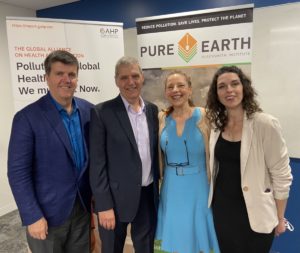
The new report, “Pollution and health: a progress update,” recently published in the Lancet Planetary Health journal, is capturing the world’s attention with its sobering look at the state of the global pollution crisis. New data in the report updates findings from the groundbreaking 2017 report from the Lancet Commission on pollution and health, and concludes that pollution is still the largest existential environmental threat to human and planetary health, causing 9 million deaths annually.
A briefing on the report at NYU’s School of Global Public Health, hosted by Dr. Jack Caravanos on May 19th, drew nearly 300 participants, who heard the report’s authors and other experts issue an urgent call to action, as global media, such as The Guardian, BBC, and Bloomberg News, led with headlines like “Pollution Kills 9 Million People a Year as Fixes Are Neglected.”
Pure Earth CEO Richard Fuller, lead author of the report, lamented the continued lack of global attention to the problem, noting the severe inadequacy of global development funds to help low- and middle-income countries, which bear the brunt of the burden.
“We absolutely know how to address the source of each specific pollution problem. What’s missing is political will,” Fuller said. “We’re sitting in the stew pot and slowly burning.”
“Deaths caused by exposure to modern pollutants such as chemicals and ambient air pollution are just skyrocketing, rising 66% since 2000,” said report co-author Rachael Kupka, executive director of the Global Alliance on Health and Pollution.
At the same time, deaths from traditional pollution, such as household air pollution from solid fuels and unsafe water, are decreasing, showing that lives can be saved with focus and investment. Kupka noted that the same can be accomplished to address modern pollution. She cited Mexico and Madagascar as an examples of countries demonstrating commitment and action to addressing their pollution issues.
The briefing closed with insights on how the scientific community, corporations, and advocates can take action to prevent pollution.
- Dr. Howard Hu, the Flora L. Thornton Chair of the Department of Population and Public Health Sciences at USC’s Keck School of Medicine, discussed the importance of collecting more data such as blood lead levels to effectively guide pollution reduction interventions.
- Ana Margarita Garza, treasurer and board member of the Clarios Foundation, talked about a new public-private global lead initiative, Protecting Every Child’s Potential, which is currently working to reduce lead poisoning in nine countries.
- And Gloria Janata, CEO of TogoRun, spoke about the need for strong advocacy to make pollution a mainstream topic of conversation
If you missed the briefing, watch a recording of the presentation and Q&A:
Read a sampling of headlines from around the world, including from the Washington Post, Reuters, AP, CBS News, NBC News, ABC News, CNN, BBC, Der Spiegel, France 24, The Hindu, and more.



